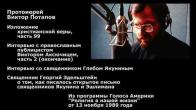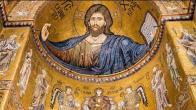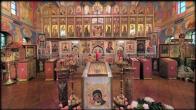You are here
The Orthodox in the Eyes of the Vatican
It is appropriate also to say a few words about the attitude of the Vatican toward us Orthodox. In the eighth volume of the Reference Book for Sacred Ministers, published by the Moscow Patriarchate, we read: "Inasmuch as the churchliness of the Orthodox Churches is incomplete, and these Churches do not give to their children of the whole plenitude of the means of salvation established by Christ, this justifies, from the Roman Catholic point of view, the maintenance of Uniate Churches and a Latin hierarchy in Orthodox countries.
"None the less, inasmuch as most of the Orthodox, in view of their special historical and cultural situation, are ignorant of (or misunderstand) the dogma of Roman primacy and the other dogmas enacted by the Roman Church after the separation, this ignorance being unwilling and therefore not imputed to them as fault, such an absence among them of the means of salvation all the same does not deprive them of the grace of the Holy Spirit, although it does produce in them, from the Roman Catholic point of view, a multitude of evils. ...Baptism is considered as always fully effectual, even in heretical and schismatical groups... Hence, according to classical Roman theology, every baptized person is by right subject to the jurisdiction of the pope.... In its relations with the Orthodox Church, the Roman Church has a tendency to reduce to a minimum the seriousness of the disagreements separating them; they are either interpreted as different expressions of the faith that do not violate its 'substantial core' or are viewed as formulж corresponding to different stages of 'doctrinal progress'..." (Reference Book for Sacred Ministers, Moscow, 1988, v. 8, pages 669-670).
The Calendar Question. Let us begin with the difference in the celebration of the Resurrection of Christ. The celebration of Pascha goes back to the first Christian generation, to the Apostolic Church. But in the first centuries of the Christian era, there was still no definite unity regarding precisely on which day Pascha - the Resurrection of Christ - ought to be celebrated. In the Christian churches of Asia Minor, where there were many Jews who had come to believe in Christ, the feast of Pascha was performed on the day of the Jewish Passover, that is, on the fourteenth day of the first spring month, Nisan. Western Christians, whose center the capital of the empire - Rome - had become already in the apostolic epoch, consisted primarily of pagans who had come to believe in Christ. To them, it seemed inadmissible to celebrate the Christian Pascha simultaneously with the Jewish Passover, because Christ resurrected after the Jewish Passover, and that is why in the Western Church, already in the early epoch, the tradition arose of performing the celebration of Pascha on the first Sunday after the vernal full moon. These two different customs of celebrating Pascha - eastern and western - existed until the First Ecumenical Council in the year 325, in the city of Nicжa, in Asia Minor. This Council, at which all the local Christian Churches, both of the East and of the West, were represented, took a decision concerning the day of the celebration of Pascha. According to the Council's decision, the Christian Pascha must be performed on the first Sunday of the vernal full moon, but always after the Jewish Passover. The Orthodox Church till now strictly adheres to this rule enacted by the First Ecumenical Council. But the Western confessions, in their historical development preserved only the first part of this decision - to celebrate Pascha on the first Sunday of the vernal full moon, and they ceased to attach significance to whether or not Pascha is celebrated after the Jewish feast or simultaneously with it.
In the year 1582, Pope Gregory XIII, in an attempt to equate the astronomical year with the ecclesiastical, commanded that ten days be skipped from the 4th to the 14th of October (the bull Inter gravissimas), and the "Gregorian" Calendar introduced by him was accepted by all the states of Western Europe.
It should be noted that in ecclesiastical questions, astronomical accuracy does not have that significance which the internal unity of believers has. And to make this unity dependent on astronomical accuracy, is, at the very least, strange.
A.N. Zelinsky, the well-known investigator of the calendar problem, writes that "astronomical accuracy even in the calendar (which has purely practical tasks) is a thing unattainable and un-necessary" ("Constructive Principles of the Ancient Russian Calendar" in the collection, Context 1978, "Science" Publishing House, Moscow, 1978, page 84 [in Russian]). The contemporary ecumenical movement seeks solutions that can resolve the calendar problem. Thus, from the 5th through the 10th of March this year, representatives of Christian confessions belonging to the World Council of Churches, together with the Council of Churches of the Near East, conducted a conference in Syria with the aim of establishing a common date for the celebration of Pascha. Ten years before this conference, Professor L. Perepoilkina foresaw that ecumenical circles will concretely attempt to work out a common approach to the Paschalia "The Julian Calendar - a Thousand-Year Icon of Time in Rus', quot; Orthodox Way, Holy Trinity Monastery, Jordanville, NY, 1988, [in Russian]; English translation is found under the title, "The Julian Calendar," in The Orthodox Church Calendar, Holy Trinity Monastery, Jordanville, NY, 1996). She writes: "Among other proposals regarding this question are two of the most discussed: 1) To appoint the feast of Holy Pascha on one fixed day according to the Gregorian Calendar (first or second Sunday of April). This proposal, which totally breaks with the decision of the Nicжan Council, was supported by the Second Vatican Council. 2) To determine the date of the celebration of Pascha by imparting a literal astronomical meaning to the concepts of 'equinox' and 'full moon'.
"According to A. Zelinsky's opinion, both of these proposals are unacceptable. The first - in connection with the astronomical and canonical deficiencies of the Gregorian Calendar and its modification; the second - in connection with the fact that 'astronomical accuracy', understood literally, would place the Church in constant dependence on the progress of astronomical knowledge. Besides that, this solution would be uncanonical, since it allows the coincidence of the Christian Pascha with the Jewish Passover, that is, it leads to a complete break with the tradition of the Holy Fathers.
"'If the Christian confessions are destined to unite sometime,' writes Zelinsky, 'this union, in the sphere of the liturgical ecclesiastical calendar, ought to rest on a solid, unshakable foundation. Only the sacred calendrical-cosmological system of the Great Cycle of Creation - the brilliant collective creation of nameless devotees of science and faith - can become this foundation.'"
©V. Potapov, 1996-98
Relics in cathedral - monthly calendar
| S | M | T | W | T | F | S |
|---|---|---|---|---|---|---|
|
|
|
|
|
|
|
1
|
|
2
|
3
|
4
|
5
|
6
|
7
|
8
|
|
9
|
10
|
11
|
12
|
13
|
14
|
15
|
|
16
|
17
|
18
|
19
|
20
|
21
|
22
|
|
23
|
24
|
25
|
26
|
27
|
28
|
|
PARISH LIFE
Address of our Cathedral
While all the materials on this site are copyrighted, you may use them freely as long as you treat them
with respect and provide attribution on the Russian Orthodox Cathedral of St.John the Baptist of Washington DC.









